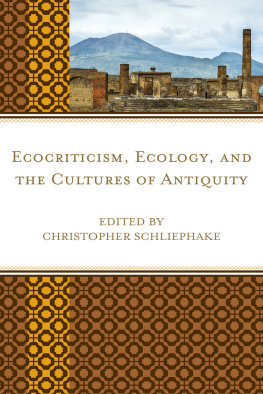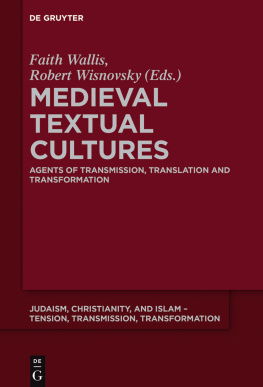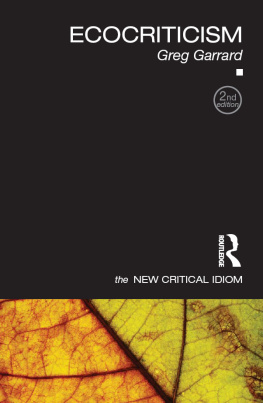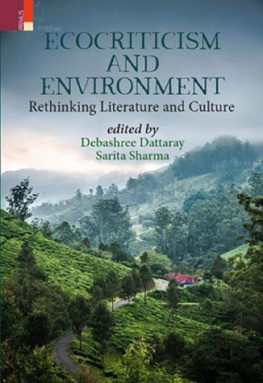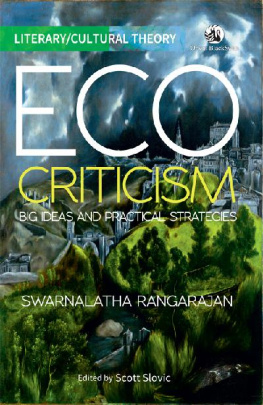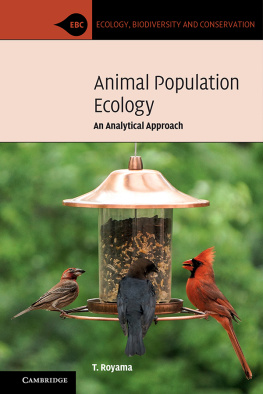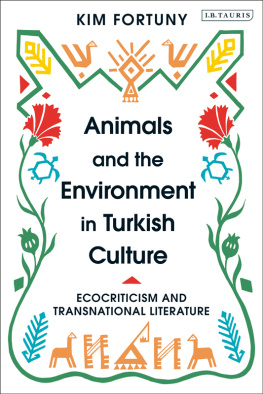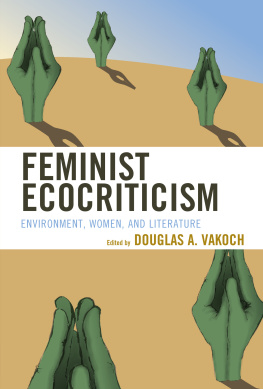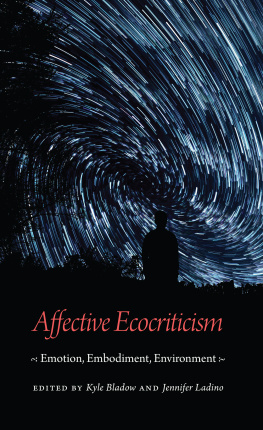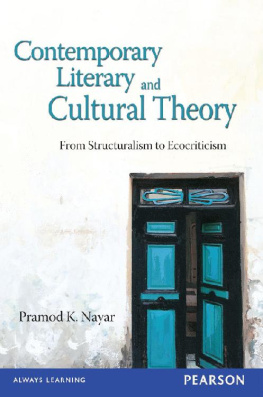Schliephake - Ecocriticism, Ecology, and the Cultures of Antiquity
Here you can read online Schliephake - Ecocriticism, Ecology, and the Cultures of Antiquity full text of the book (entire story) in english for free. Download pdf and epub, get meaning, cover and reviews about this ebook. City: Lanham, year: 2017, publisher: Lexington Books, a division of Rowman & Littlefield Publishers, Inc., genre: Romance novel. Description of the work, (preface) as well as reviews are available. Best literature library LitArk.com created for fans of good reading and offers a wide selection of genres:
Romance novel
Science fiction
Adventure
Detective
Science
History
Home and family
Prose
Art
Politics
Computer
Non-fiction
Religion
Business
Children
Humor
Choose a favorite category and find really read worthwhile books. Enjoy immersion in the world of imagination, feel the emotions of the characters or learn something new for yourself, make an fascinating discovery.
- Book:Ecocriticism, Ecology, and the Cultures of Antiquity
- Author:
- Publisher:Lexington Books, a division of Rowman & Littlefield Publishers, Inc.
- Genre:
- Year:2017
- City:Lanham
- Rating:4 / 5
- Favourites:Add to favourites
- Your mark:
- 80
- 1
- 2
- 3
- 4
- 5
Ecocriticism, Ecology, and the Cultures of Antiquity: summary, description and annotation
We offer to read an annotation, description, summary or preface (depends on what the author of the book "Ecocriticism, Ecology, and the Cultures of Antiquity" wrote himself). If you haven't found the necessary information about the book — write in the comments, we will try to find it.
Schliephake: author's other books
Who wrote Ecocriticism, Ecology, and the Cultures of Antiquity? Find out the surname, the name of the author of the book and a list of all author's works by series.
Ecocriticism, Ecology, and the Cultures of Antiquity — read online for free the complete book (whole text) full work
Below is the text of the book, divided by pages. System saving the place of the last page read, allows you to conveniently read the book "Ecocriticism, Ecology, and the Cultures of Antiquity" online for free, without having to search again every time where you left off. Put a bookmark, and you can go to the page where you finished reading at any time.
Font size:
Interval:
Bookmark:
Ecocriticism, Ecology, and the Cultures of Antiquity
Ecocritical Theory and Practice
Series Editors : Douglas A. Vakoch, California Institute of Integral Studies, USA
Advisory Board
Joni Adamson, Arizona State University, USA; Mageb Al-adwani, King Saud University, Saudi Arabia; Bruce Allen, Seisen University, Japan; Hannes Bergthaller, National Chung-Hsing University, Taiwan; Zlia Bora, Federal University of Paraba, Brazil; Izabel Brando, Federal University of Alagoas, Brazil; Byron Caminero-Santangelo, University of Kansas, USA; Jeffrey J. Cohen, George Washington University, USA; Simo Farias Almeida, Federal University of Roraima, Brazil; Julia Fiedorczuk, University of Warsaw, Poland; Camilo Gomides, University of Puerto RicoRio Piedras, Puerto Rico; Yves-Charles Grandjeat, Michel de Montaigne-Bordeaux 3 University, France; George Handley, Brigham Young University, USA; Isabel Hoving, Leiden University, The Netherlands; Idom Thomas Inyabri, University of Calabar, Nigeria; Serenella Iovino, University of Turin, Italy; Adrian Ivakhiv, University of Vermont, USA; Daniela Kato, Zhongnan University of Economics and Law, China; Petr Kopeck, University of Ostrava, Czech Republic; Mohammad Nasser Modoodi, Payame Noor University, Iran; Patrick Murphy, University of Central Florida, USA; Serpil Oppermann, Hacettepe University, Turkey; Rebecca Raglon, University of British Columbia, Canada; Anuradha Ramanujan, National University of Singapore, Singapore; Christian Schmitt-Kilb, University of Rostock, Germany; Marian Scholtmeijer, University of Northern British Columbia, Canada; Heike Schwarz, University of Augsburg, Germany; Murali Sivaramakrishnan, Pondicherry University, India; Scott Slovic, University of Idaho, USA; J. Etienne Terblanche, North-West University, South Africa; Julia Tofantuk, Tallinn University, Estonia; Jennifer Wawrzinek, Free University of Berlin, Germany; Cheng Xiangzhan, Shandong University, China; Yuki Masami, Kanazawa University, Japan; Hubert Zapf, University of Augsburg, Germany
Ecocritical Theory and Practice highlights innovative scholarship at the interface of literary/cultural studies and the environment, seeking to foster an ongoing dialogue between academics and environmental activists.
Recent Titles
Ecocriticism, Ecology, and the Cultures of Antiquity , edited by Christopher Schliephake
Ecotheology and Nonhuman Ethics in Society: A Community of Compassion , edited by Melissa Brotton
The Ethics and Rhetoric of Invasion Ecology , edited by James Stanescu and Kevin Cummings
Disability and the Environment in American Literature: Toward an Ecosomatic Paradigm , edited by Matthew J.C. Cella
Ecocriticism, Ecology, and the Cultures of Antiquity
Edited by
Christopher Schliephake
Foreword by
Brooke Holmes
Afterword by
Serenella Iovino
Lexington Books
Lanham Boulder New York London
Published by Lexington Books
An imprint of The Rowman & Littlefield Publishing Group, Inc.
4501 Forbes Boulevard, Suite 200, Lanham, Maryland 20706
www.rowman.com
Unit A, Whitacre Mews, 26-34 Stannary Street, London SE11 4AB
Copyright 2017 by Lexington Books
All rights reserved . No part of this book may be reproduced in any form or by any electronic or mechanical means, including information storage and retrieval systems, without written permission from the publisher, except by a reviewer who may quote passages in a review.
British Library Cataloguing in Publication Information Available
Library of Congress Cataloging-in-Publication Data Available
ISBN 978-1-4985-3284-6 (cloth : alk. paper)
ISBN 978-1-4985-3285-3 (electronic)
 The paper used in this publication meets the minimum requirements of American National Standard for Information SciencesPermanence of Paper for Printed Library Materials, ANSI/NISO Z39.48-1992.
The paper used in this publication meets the minimum requirements of American National Standard for Information SciencesPermanence of Paper for Printed Library Materials, ANSI/NISO Z39.48-1992.
Printed in the United States of America
Contents
Brooke Holmes
Christopher Schliephake
J. Donald Hughes
Justine Walter
Aneta Kliszcz and Joanna Komorowska
Hannes Bergthaller
Thomas Sharkie and Marguerite Johnson
Richard Hutchins
Christopher Chinn
Vittoria Prencipe
Katharina Donn
Terry Gifford
Laura Sayre
Lars Keler and Konrad Ott
Roman Bartosch
Anna Banks
Lucy Mercer and Laurence Grove
Christopher Schliephake
Jingcheng Xu
Kate Rigby
Serenella Iovino
Brooke Holmes
The first messenger speech of Euripides Bacchae describes an idyll-turned nightmare. A herdsman following his cattle as they graze the mountainside beyond the city walls comes across the royal women of Thebes sprawled languorously among pines and oaks, under the spell of Dionysus. Awakened by the cattles lowing, they spring to actionsuckling gazelles and wolf pups, taking up garlands of ivy and yew, striking the earth to bring forth streams of wine, milk, and water. On cue, they raise their voices in unison in celebration of Bacchus, and the whole mountain revels along with them, and the animals, and nothing is unmoved by their running (Eur. Bacch . 72627). The joyful symbiosis of mountain, beast, and human is broken, however, when the herdsmans companions, tempted by the kings promise of a sizable ransom, try to capture the Bacchants. The mens hostile interference triggers a sudden change in the flow of energies. The women turn violent; animated by a supernatural force, they fall on the domestic animals and rip them apart barehanded. Bearing witness to these marvels, the herdsman beseeches Pentheus to recognize the power of Dionysuswithout success. Before the end of the play it will be Pentheus who is the object of the Bacchants hunt.
Nearly every aspect of this uncanny scene seems to confirm modern understandings of Dionysus as a nature-god. Indeed, whether we adopt the venerable structuralist opposition of nature and culture, a hermeneutic framework of proto-pastoral, a vantage point from the history of religion on the cult of Dionysus or even more recent paradigms of human and nonhuman relations, it is almost impossible to describe what is happening at this moment in the Bacchae without talking about nature. Yet the language of the word usually translated as nature, physis , is nowhere to be found in the Greek text. Its absence is no reason for surprise. If we were to survey representations of the natural world in ancient Greek literature, we would not find much. The modern use of the word nature to cover a wide range of ideas associated with the environment, landscape, flora and fauna, and the cosmic totality of all beings does not coincide with the semantic field of any ancient Greek lexeme. Does this mean that the ancient Greeks had no concept of nature? What would the words absence mean for an ecocriticism that seeks to reach back to antiquity?
In fact, an antiquity before nature looks increasingly like a desideratum in the light of recent attacks leveled against the concept of nature as a pernicious fiction standing in the way of a healthier relationship to the nonhuman world, from Bruno Latours Politics of Nature (2004) to Timothy Mortons Ecology without Nature (2007). The commitment to a uniform nature underlying a manifold of cultures has in recent years been diagnosed by the Amazonian anthropologists Philippe Descola (2013) and Eduardo Viveiros de Castro (2012) as mononaturalism, just one ontology among other possible worlds, and one that would be enriched by serious consideration of alternative ways of ordering the cosmos . The comparative analysis of cultures that organize their ontologies and their systems of human and nonhuman relations without the entrenched, deeply overdetermined category of nature is undeniably one of the most important undertakings in the environmental humanities. Do the cultures of Greco-Roman antiquity belong in this group?
Next pageFont size:
Interval:
Bookmark:
Similar books «Ecocriticism, Ecology, and the Cultures of Antiquity»
Look at similar books to Ecocriticism, Ecology, and the Cultures of Antiquity. We have selected literature similar in name and meaning in the hope of providing readers with more options to find new, interesting, not yet read works.
Discussion, reviews of the book Ecocriticism, Ecology, and the Cultures of Antiquity and just readers' own opinions. Leave your comments, write what you think about the work, its meaning or the main characters. Specify what exactly you liked and what you didn't like, and why you think so.

